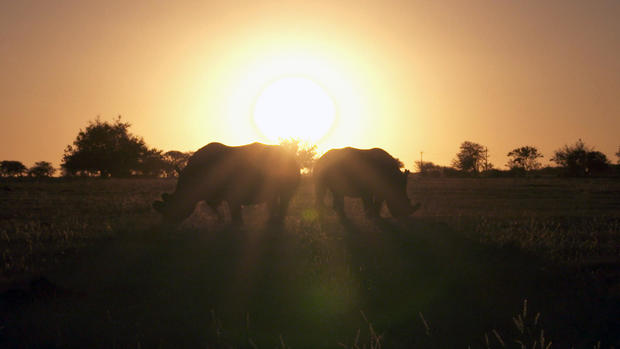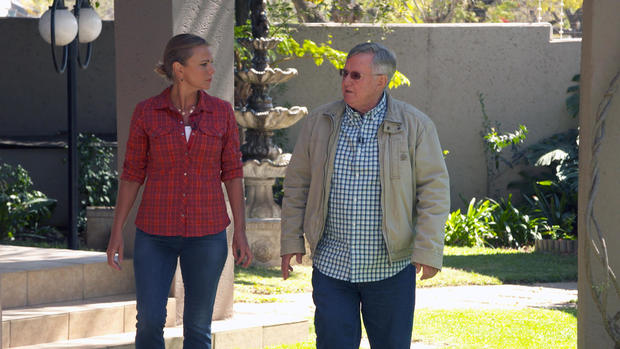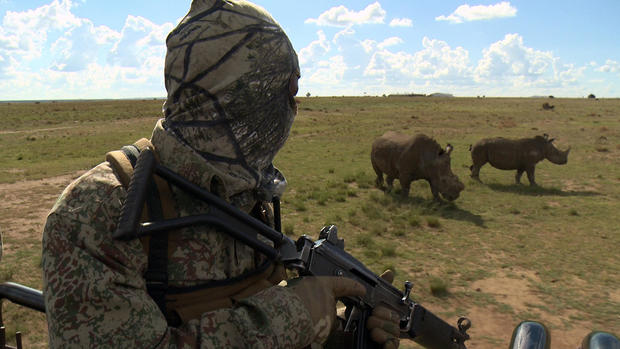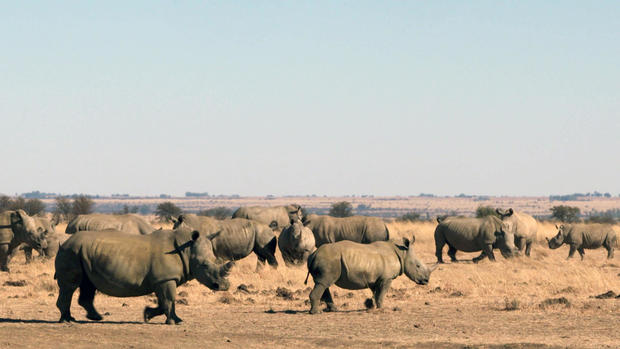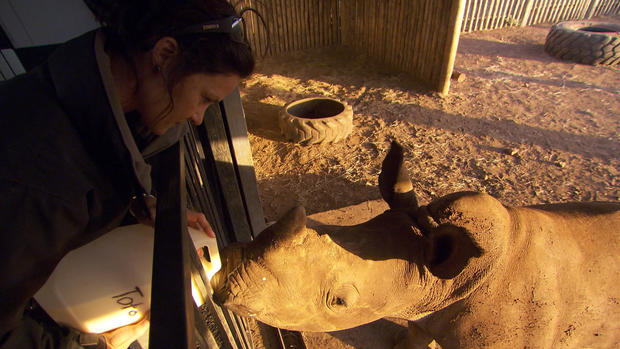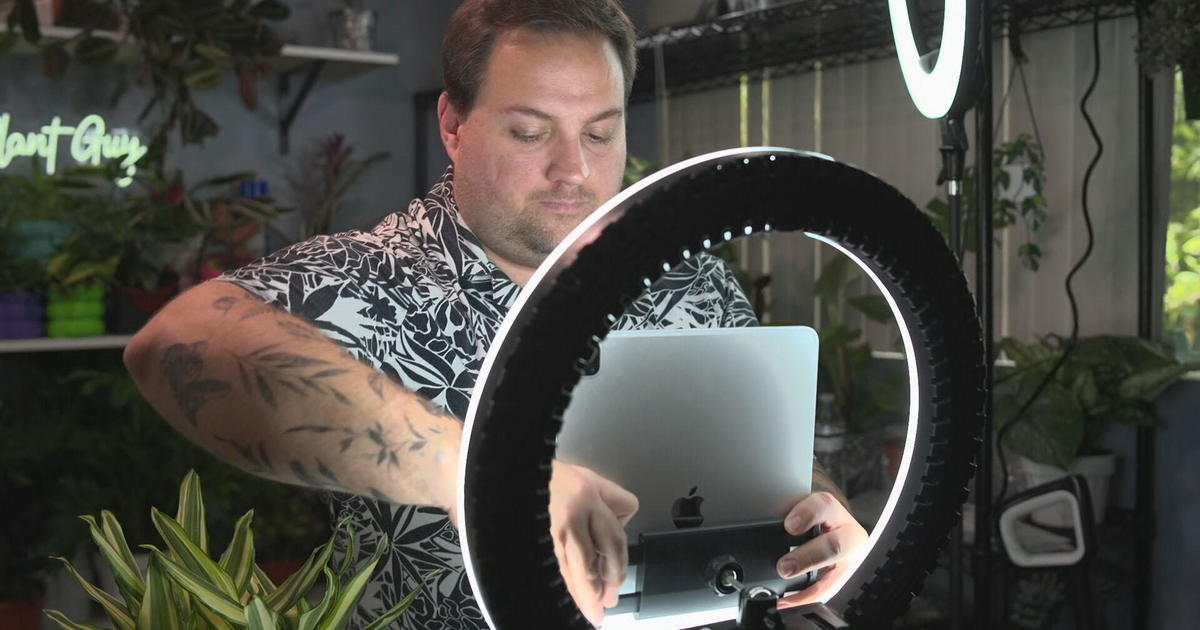Controversial rhino horn sales eyed as solution to poaching crisis
We think of the rhinoceros lumbering through the bush on its tank-like body; a magnificent, if cumbersome, creature of the wild.
But in South Africa's parks and game reserves, rhino are being slaughtered at the rate of three a day, targeted by poachers who want their horns.
Tonight we'll show you an unusual and controversial plan to save the rhino by removing them from the wild and, instead, farming them like cattle.
It's quite a departure from another solution to the rhino crisis we showed you last December – which was aimed at keeping them in their natural habitat.
Doing that required something unusual and unforgettable – an airlift. Which is how we started our earlier report.
Take a black rhino weighing nearly a ton, after it's been darted and sedated.
Attach four leg straps to a 130-foot chain.
And lift it underneath a half-century old Huey helicopter.
Lara Logan: Woo! Look at that.
Jacques Flamand: Amazing isn't it?
For 15 years, this airlift has been veterinarian Jacques Flamand's way to increase the number of black rhino in the wild -- moving them to new locations in South Africa. It's helping but this elaborate version of catch and release comes with its own risk.
Jacques Flamand: The downside of that is that we're spreading them to areas where they might be poached. We feel great. We've caught some rhino. Yes, we're gonna put them in a new place. Will they be safe? That's always the big question. And nowhere is safe, sadly.
Lara Logan: So why is that?
Jacques Flamand: Well, because there is that stupid demand for rhino horn.
The rhino horn is made of nothing more than keratin, the main component in human fingernails. Yet in Vietnam and China, the horn is prized as a folk remedy for hangovers and a way to increase virility. Ground into powder it can be worth more by the ounce than gold.
South Africa's poaching crisis began in 2008, when 83 rhino were killed. The government banned the sale of rhino horn in response, but poaching skyrocketed – and for the past five years, more than a thousand rhino have been slaughtered every year.
John Hume: The rhino's got the answer to its survival. We've just got to help it use it.
Lara Logan: And the answer is the horn?
John Hume: The only answer that the rhino has got is the horn.
South African rancher John Hume has an answer to the poaching crisis -- and it's surreal -- a rhino farm. Here you see two types of rhino species, black and white, some dehorned some half-horned. All lining up on schedule for their daily feed, ready for a tractor to bring them a mix of grass and grains.
Not all want to share; it seems as far from the wild as you can get. They're fed and bred like livestock.
Lara Logan: There's just something about seeing those rhinos come to the feeding troughs, that can seem, can look unnatural.
John Hume: My rhinos are making a certain amount of sacrifices in saving their species from extinction.
John Hume started with one rhino 25 ago. Now, he's got more than 1,500, the largest private herd in the world.
John Hume: Rhinos are fairly user-friendly, especially white rhino.
Lara Logan: Because they adapt quickly.
John Hume: Yes, if you treat them properly.
Lara Logan: Your rhino are breeding, faster than they do in the wild.
John Hume: Just treat them right and they'll breed. And that's what we should be doing.
That's John Hume the businessman talking, the one who made his fortune in resort hotels and who now harvests rhino horn as a cash crop.
He's not the only one to remove the horns. It's common practice these days in South Africa so there's nothing to poach. It's painless for the rhino, there are no nerve endings, and the horn grows back in a few years.
Most rhino owners have stockpiles; what sets John Hume's apart is size -- six tons. It could be worth hundreds of millions of dollars.
But to protect his herd and his stockpile from poachers takes a small, well-armed security force, a helicopter for surveillance and the latest high-tech gear, including thermal cameras. That's costing him $2 million a year. And he said he's going broke.
John Hume: I don't have the wherewithal to raise huge amount of money other than sell the rhino horn. That's the only method I have.
He couldn't sell rhino horn until last year, when he sued the South African government to lift the ban and won. John Hume argued legal sales would flood the market, drive down the price and force poachers out of business. He compares it to America before prohibition was repealed.
John Hume: All you did was build up a black market and the criminals of the world, the Al Capones of the world, were very, very active when you tried to ban alcohol in America. Now we've done the same thing with rhino horn. It's created criminals. It's pushed the price through the roof. Bans have never worked.
Lara Logan: Are you really doing this to save the rhino or are you doing this to make money and those two goals just happen to coincide in your view?
John Hume: Well, it would be wonderful if they did coincide. But I don't think they will.
Lara Logan: Why not?
John Hume: I don't think the price of rhino horn will even get to $10,000 a kilo. I think it'll be more like $5,000 a kilo. And if I got $5,000 a kilo for my rhino horn it would maybe just pay the running costs. Maybe.
The idea of putting a price tag on rhino horn or calling his farm the best hope for the survival of the species has made John Hume a detested figure in the conservation community. Just ask Jacques Flamand.
Jacques Flamand: You know, God forbid, you know, if-- if one day we all go to John Hume and say, "Please give us some rhinos to restock our game reserves." I mean, that'll be a really sad day.
Lara Logan: What about the bigger debate over legalizing rhino horn?
Jacques Flamand: The arguments are that if you make it legal, the price will go down and it will stop syndicates being interested in in marketing it. But I don't for a moment believe it'll stop rhino horn poaching. You know, it's legal to trade in cattle, but you still get cattle rustling. It hasn't stopped theft of any sort.
Lara Logan: What do you do? Do you continue the way it is now? Or do you--
Jacques Flamand: We just have to stop the demand. But in Asia, where we are powerless, we've just got to stop people wanting it.
Lara Logan: Is John Hume right? Is he wrong? What do you think?
Dave Cooper: You've got to start somewhere. Every private rhino owner is in favor.
Dave Cooper is the government's chief veterinarian in this area and he's worked side by side with Jacques Flamand for years. They agree on most things but not on how to end poaching.
Dave Cooper: I believe we're gonna have to compromise.
Lara Logan: Even if you don't like it.
Dave Cooper: Even if you don't like it.
Lara Logan: And given how close you are to the rhinos, people would expect you to be, you know, dead set against it.
Dave Cooper: If there are private rhino owners who want to dehorn their rhino and dehorn not for security reasons, but dehorn in order to supply a market, then that's up to them. At least we have live rhino running around.
These babies are the collateral damage from poaching. Makhosi, Isimiso, and Ntoto should be in the wild; instead, they're in this rhino orphanage. There's also Charlie, a baby hippo who just thinks he's a rhino.
Karen Odendaal runs the orphanage. She asked us to keep its location a secret.
Lara Logan: It's so lovely to be able to-- to be so close to a rhino. But it's also-- something so sad and tragic about it.
Karen Odendaal: The saddest part about having to put an orphanage together is that we're failing. 'Cause why are we having to put orphanages together to care for orphaned rhino? It means that we've-- you know, we-- we're not winning the rhino war.-- it's quite depressing because, you know, when is it gonna end.
Karen Odendaal took these rhino in after another orphanage was attacked. Poachers killed two babies for their horns and one of their caretakers was raped. Reason enough for the pistol on her hip. But Ntoto has a way of lightening up any conversation.
Lara Logan: Ntoto! He's so naughty and he's so strong.
Karen Odendaal: He's very strong. He's very strong. So he can smell the cubes and he's like, come on—
Lara Logan: He's like, why aren't you giving them to me?
Karen Odendaal also runs a private park where South Africa's big game is on full display. The rhino here are tougher to spot. They prefer hiding in the bush. They're herbivores and some use their horns to get to the leaves and grass and thorns that are their main source of food in the wild.
For security, Odendaal won't reveal how many rhino are there, only that they've lost 15 to poachers in the last four years.
The rest have been dehorned, reluctantly.
Karen Odendaal: Rhinos have horns because they're rhino. And now, we're having to take something that's so much part of their identity away from them because of human greed. It's just...
Lara Logan: It's the defining characteristic of a rhino, right?
Karen Odendaal: Absolutely. Unfortunately, it's something that we have to do to keep them alive.
Keeping her rhino alive means spending 75 percent of her budget on security.
Like John Hume, she could use the money selling the rhino horns would bring in.
Karen Odendaal relies on Mfundisi Ntanzi to monitor every rhino at the game park. He said the poachers are mostly local, employed by organized crime groups.
We asked him if he felt threatened by the poachers.
Mfundisi Ntanzi (Translation): We are scared of poachers, and it's very tricky because it's somebody you don't know, or it's somebody who could be in your community. And that's why we're very wary of them, because it could be your neighbor.
Lara Logan: Why do people poach?
Mfundisi Ntanzi (Translation): I think that's the biggest problem we have is that people know the value or what they can get for the horn, and they end up doing it out of desperation.
Just beyond the gates of the game park, it is the lack of jobs and opportunity that drives people into poaching. They make a fraction of what the horn sells for in Asia, but enough to help a family here live for months.
The poachers could be all but gone if John Hume's plan works. Driven away by the legal sale of cheaper rhino horn.
He believes he can save the species from extinction by having his rhino give up life in the wild.
Lara Logan: Some would say that's a big sacrifice.
John Hume: Well, then they should be even more grateful to my rhinos if the sacrifice is big. Because I'm telling you we are losing the war. And you know Einstein's saying -- to go on doing the same thing over and over and expect a different answer is insanity. And that's what we are doing at the rhino's cost.
Produced by Henry Schuster and Rachael Morehouse. Associate producers, Sarah Carter and Alex J. Diamond.
To learn more about rhino conservation efforts, visit the sites below.
WWF: https://wwf.org/60minutesrhino and 1-800-960-0993
RHINO ORPHANAGE: www.zululandconservationtrust.org
MANYONI: www.manyoni.co.za
DAVE COOPER: http://www.africanwildlifevets.org/
